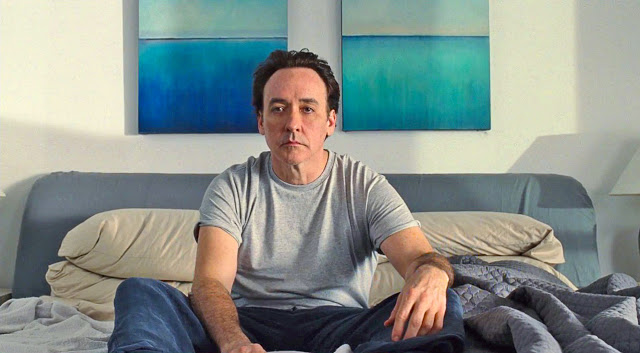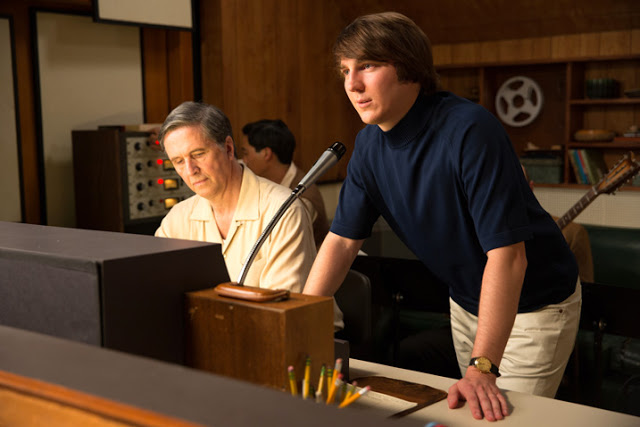Being a musical genius must be hard. You hear harmonies no one else can hear, you struggle to communicate your vision to your band mates and studio bosses, and if you’re fortunate enough to be able to actually produce revolutionary music, your innovative advances often go unnoticed until they’re discovered by later generations. But making a movie about such a genius—conveying those enigmatic bursts of internal, auditory inspiration through the visible, visual medium of cinema—is similarly perilous. Love & Mercy, Bill Pohlad’s strange and sensitive biopic of the Beach Boys’ Brian Wilson, does not entirely conquer this challenge. Despite its whirring sound design and persistent effort, it never quite communicates the creative synapses firing within its protagonist’s big, drug-addled brain. But Love & Mercy is nevertheless a compelling portrait of artistic triumph and toil. It is also, more surprisingly, a touching romantic drama. It’s odd that a film about such an idiosyncratic man is at its best when it is at its most conventional.
That doesn’t stop Pohlad, working from a screenplay by Oren Moverman (director of The Messenger) and Michael Alan Lerner, from laboring strenuously to circumvent the customs of the genre. His most obvious and daring maneuver is to structure Love & Mercy as two separate mini-movies. In one, set in the mid-’60s, Wilson (Paul Dano) drifts from his brothers and colleagues while obsessing over the production of the Beach Boys’ seminal album, Pet Sounds. In the other, set some 20 years later, a mentally ill, overmedicated Wilson (now played by John Cusack, delivering his best performance in more than a decade) romances a Cadillac saleswoman, Melinda Ledbetter (Elizabeth Banks, radiant), and wilts under the yoke of his domineering psychotherapist, Dr. Eugene Landy (Paul Giamatti, bewigged and ferocious). Love & Mercy toggles back and forth between the two eras without any particular rhythm or formula. (Think The Godfather Part II, only, er, not quite as good.) It’s an engrossing approach that nonetheless fails to reap any real dividends; it’s fair to wonder how the film would have played in linear fashion, given that neither subplot clearly informs the other. Of course, that lack of causality between the two stories is arguably the point, which is why, in the abstract, Love & Mercy‘s jagged chronology makes sense. This is a fractured movie about a broken man.
Besides, if each segment feels like its own story, each provides its own distinct, tactile pleasures. The most enjoyable scenes in the dramatization of Wilson’s early years take place in the recording studio, where he works feverishly with the professional musicians of the Wrecking Crew (the subject of their own recent documentary, and played here by instrumentalists rather than actors) to develop Pet Sounds‘ novel, near-heretical sound. He improvises madly, turns cellists into de-facto percussionists, and even brings in barking dogs. (When a flautist politely informs Wilson that he inadvertently wrote a song in two different keys and that such an arrangement doesn’t make sense, he nonchalantly responds, “It does in my head.”) It is always delightful to observe the messy, madcap process of making art, and Pohlad smartly stages the recording sequences with bustling, unpredictable energy. Dano does his best work in these scenes, articulating Wilson’s starry-eyed enthusiasm and indescribable musical vision.
Then again, vision is in the eye of the beholder. Wilson recorded much of Pet Sounds while the rest of the Beach Boys toured in Japan; when Love & Mercy depicts their stateside return, the band runs into problems, and so does the movie. The central conflict is between Wilson and his cousin, Mike Love (Jake Abel), who instantly dismisses Wilson’s work on Pet Sounds as pretentious pouting (“Even the happy songs are sad!”) and bemoans the absence of the radio-friendly surf-pop that characterized the Beach Boys’ earlier albums. Gradually, Love wrests control of the band from Wilson, leading to the latter’s much-publicized descent into drug-fueled mania.
Now, this turf war between Wilson and Love may be rooted in fact, but its authenticity is beside the point. In painting Love as a callous villain, Love & Mercy unwittingly falls victim to a lamentable display of smug elitism. The unavoidable implication of the conflict here—a battle between the misunderstood genius and the greedy capitalist intent on repressing that genius—is that commerce is the enemy of art, and that a sincere motivation to sell records is anathema to the nobler goal of making great music. The problem is not just that this dichotomy is false; it’s that the Beach Boys’ catalog specifically puts the lie to it. Pet Sounds may be a legendary album, but Love & Mercy seems to suggest that Wilson’s earlier works are comparatively lacking in artistic integrity, even though many of them—from “Surfin’ USA” to “I Get Around” to “California Girls”—are truly fantastic pop songs. (Seizing on this, Pohlad presents bursts of such hits in an early montage, while composer Atticus Ross deftly threads samples of the band’s work throughout his original score.) As a result, the plaintive tone of the movie’s late-’60s arc—in which Wilson pursues and then ultimately abandons his work on SMiLE, his even more ambitious follow-up to Pet Sounds—comes dangerously close to the haranguing shriek of a sermon.
This is where the film’s jumpy structure works in its favor. Because Pohlad cuts back and forth from the ’60s to the ’80s, we never spend too long wallowing in Wilson’s suffering. At least, not his past suffering. The latter-day scenes have no shortage of pain and abuse, supplied entirely by Dr. Landy, whom Giamatti portrays as a sadistic cross between vicious drill sergeant and pill-pushing life coach. It’s a curiously one-note performance from such a dexterous actor, but Giamatti certainly succeeds in making Landy scary, never more so than in a terrifying sequence where he berates a hungry Wilson for eating a hamburger, screaming inches from his face while his charge mumbles helplessly.
Yet even if the ’80s subplot is scarier than its companion piece, it’s sweeter, too. That’s because the true heart of Love & Mercy is the achingly tender romance between Wilson and Melinda. Their meet-cute, in which Wilson whispers about his brother’s drowning to a thunderstruck Melinda as they sit in a floor-model Cadillac, is a stunning piece of writing, and their subsequent interactions only grow richer and more suffused with feeling. (And funny as well; I assure you that you have never seen a more charming discussion of the efficacies of Matzo ball soup.) Pohlad’s filmmaking is most lively when Cusack and Banks share the screen, as in a beautiful two-shot at a diner where he frames Cusack in a mirror, so that even though his actors are seated across from one another, it’s as though they’re side by side. And a painful scene where Wilson frantically attempts to usher Melinda out of his house to hide her from the approaching Landy—”Leave, but don’t leave me!”—is somehow heartbreaking and heartwarming at once. Pohlad also lets this striking love story bloom at an appropriately modest pace, goosing it only with the slightest twinges of melodrama. While a less patient director would have peppered the romantic scenes with on-the-nose Beach Boys songs, he exercises restraint, finally unleashing the group’s iconic “Wouldn’t It Be Nice” at just the right moment.
He also benefits from working with a pair of terrific actors. If nothing else (though it has plenty else), Love & Mercy confirms what we’ve suspected all along: Elizabeth Banks is a real talent. With talon-like fake nails that clutch at her bag and a smile that tugs at your heart, Melinda is not a token female savior but a fully realized character, and Banks imbues her with enormous reserves of empathy. Even more gratifying, however, at least for this disciple of High Fidelity, is Cusack’s quietly devastating performance. Throughout the film, he barely speaks louder than a murmur, but the delicacy of his work—the hunger and loneliness in his eyes, the awkwardness of his body language, the melancholic twinge in his voice—combine to create a singularly persuasive portrayal of a wounded man desperate to break free. Forgive my optimism, but it’s a performance that promises that Cusack, in the midst of a prolonged slump, is destined to return to form as the sharp and soulful actor he was always destined to be. Now wouldn’t that be nice.
Jeremy Beck is the editor-in-chief of MovieManifesto. He watches more movies and television than he probably should.



